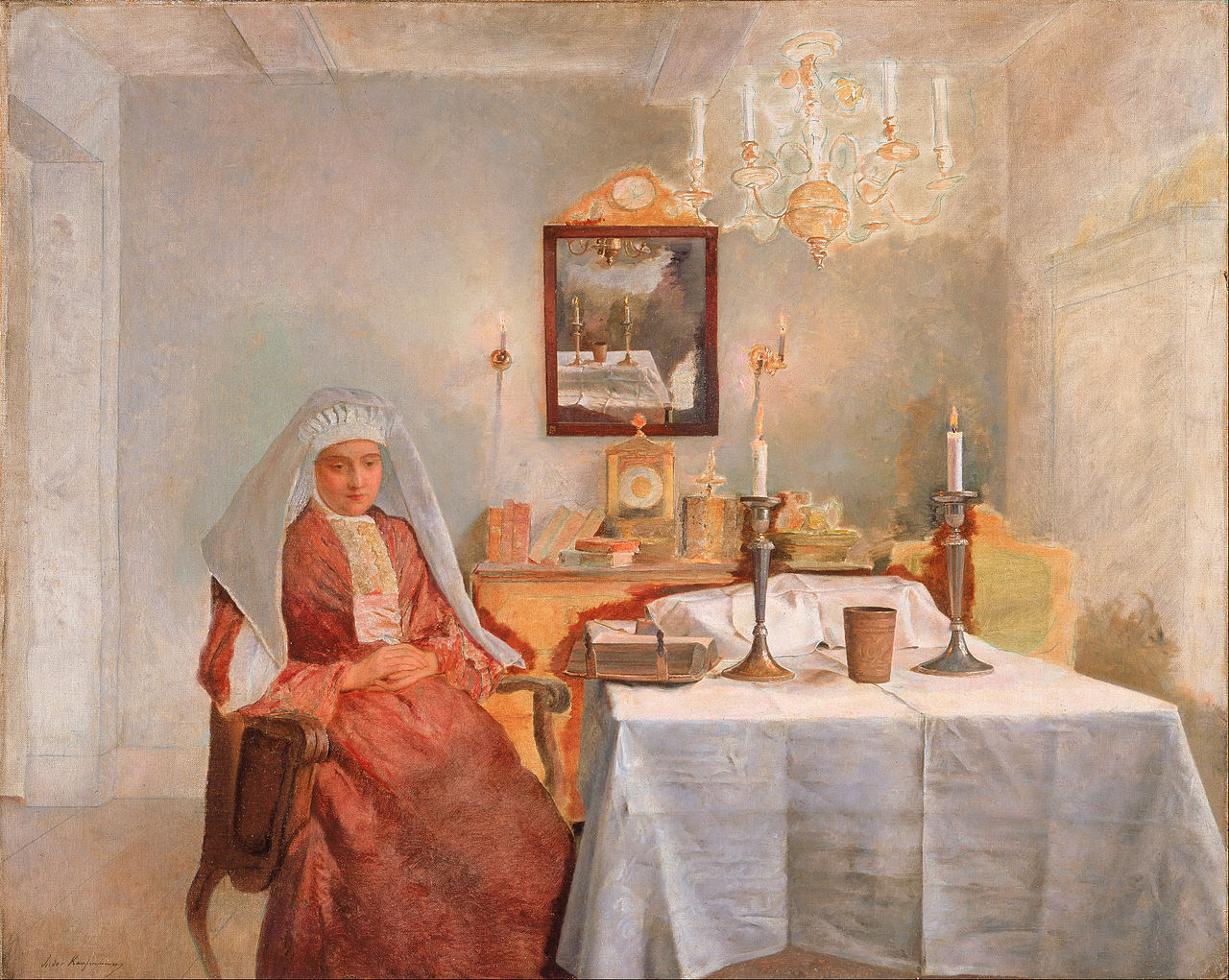⤷ You are here:
🖖︎ Prayers & Praxes —⟶ 🌞︎ Prayers for the Sun, Weekdays, Shabbat, and Season —⟶ Shabbat —⟶ Se'udat Leil Shabbat —⟶ Page 2 🡄 (Previous category) :: 📁 Arvit l'Shabbat 📁 Psuqei d'Zimrah/Zemirot l'Shabbat ul'Yom Tov :: (Next Category) 🡆 Sorted Chronologically (old to new). Sort most recent first? A popular piyyut for Simḥat Torah (4th hakkafah) originally composed as a piyyut for Shavuot and often referred to by its incipit, “Mipi El.” . . . Categories: Tags: 17th century C.E., 54th century A.M., acrostic, Alphabetic Acrostic, אין אדיר Ayn Adir, הקפה ד׳ fourth haḳafah, פיוטים piyyuṭim, via negativa, זמירות zemirot Contributor(s): An interpretive translation of the shabbes hymn, Yah Ekhsof. . . . The shabbos table song “Yah Ekhsof No’am Shabbat” by Rabbi Aharon of Karlin, translated by Rabbi Morrison David Bial was first published in his anthology, An Offering of Prayer (1962), p. 29-30, from where this translation was transcribed. . . . Categories: Tags: Contributor(s): “Prinzessin Sabbat” by Heinrich Heine, in Romanzero III: Hebraeische Melodien, (“Princess Shabbat,” in Romanzero III, Hebrew Melodies.), 1851 was translated into English by Margaret Armour (1860-1943), The Works of Heinrich Heine vol. 12: Romancero: Book III, Last Poems (1891). We have replaced “schalet” (unchanged in Armour’s translation) with cholent. . . . Categories: Tags: 19th century C.E., 57th century A.M., Elysium, food, Gashmiut and Ruchniut, German orientalism, German romanticism, לכה דודי Lekhah Dodi, lycanthropy, Ode to Joy, Sabbath Queen, Sardonic poetry, שכינה Shekhinah Contributor(s): This paraliturgical “Shalom Aleikhem” is as found in Rabbi David Einhorn’s עלת תמיד Gebetbuch für Israelitische Reform-Gemeinden (1858), p. 417. The English translation here, by Joshua Giorgio-Rubin, translating Rabbi David Einhorn, is as found in Rubin’s Olat Hadashah: A Modern Adaptation of David Einhorn’s Olat Tamid for Shabbat Evening (2020), pp. 13-14. . . . A piyyut and table song for Shabbat by the chief rabbi of the Ottoman Empire. . . . Categories: Tags: Contributor(s): This paraliturgical adaptation of the piyyut Shalom Aleikhem by Lise Tarlau (“Engelsgruß. (Scholaum alechem.)”) can be found in Rabbi Max Grunwald’s anthology of Jewish women’s prayer, Beruria: Gebet- und Andachtsbuch für jüdische Frauen und Mädchen (1907), page 85. . . . This prayer-poem on receiving a parent’s Sabbath Blessing was written by Jessie Ethel Sampter and published in her Around the Year in Rhymes for the Jewish Child (1920), p. 25. . . . The text of Yehudah haLevi’s piyyut, “Al Ahavatekha Eshteh Gəvi’i,” with a German translation by Franz Rosenzweig. . . . The popular adjuration of the angels of peace and ministering angels, Shalom Aleikhem, in Hebrew with a German translation by Franz Rosenzweig. . . . The Masoretic Hebrew text of Proverbs 30:10-31, the alphabetic acrostic “Eshet Ḥayil,” with a German translation by Franz Rosenzweig. . . . The poem “Friday Eve” by Rabbi Alter Abelson (1931). . . . Categories: Tags: Contributor(s): The popular Israeli song from the 1950s. . . . Categories: Tags: Contributor(s): We call to sukkat shalom, the shelter of peace, all of our various selves To rest from the contortion of social life and the demands of others. We liberate ourselves and each other from roles and titles labels and closets positions and pretendings internalized oppressions and oppressive projections hierarchies and competition. . . . Categories: Tags: 20th century C.E., 58th century A.M., eco-conscious, קידוש ḳiddush, North America, Teva Learning Center Contributor(s): Trisha Arlin shares “Motzi”, a kavanah (intention) for the blessing, Hamotzi Lehem Min Ha’aretz, over challah. Describing the kavanah she writes that it’s, “based on Rabbi Ellen Lippmann’s tradition on having us create a chain of touch around room that leads to and from the challah, which she then explains as both exemplifying the connection created when people eat together and the chain of work that went to creating the challah itself.” . . . Categories: Tags: 21st century C.E., 58th century A.M., ברכת המוציא birkat hamotsi, bread, English vernacular prayer, food, חלה challah ḥallah, Kolot Chayeinu, Prayers as poems, yom tov Contributor(s): Peri and Alex Sinclair’s adaptation of the traditional Eishet Ḥayil, replacing a number of verses with ones selected from Shir haShirim (the Song of Songs/Canticles), Genesis, and elsewhere in Mishlei (Proverbs). . . . Categories: Tags: 21st century C.E., 58th century A.M., acrostic, Alphabetic Acrostic, eros, אשת חיל eshet ḥayil, Feminism, love, Masorti, Modi'in, role models, ישראל Yisrael Contributor(s): Benyamim Sedaka’s English translations of the Israelite-Samaritan “Blessing on the Food” (Kiddush) and Abraham ben Marchiv Tsedaka Hassafari’s opening to the Friday night Shabbat meal . . . Categories: Tags: Contributor(s): This version of Eyshet Ḥayil replaces valor with value, and while it speaks of man in terms of family, community, and the natural world, it is not heteronormative. . . . Categories: Tags: 21st century C.E., 58th century A.M., English vernacular prayer, אשת חיל eshet ḥayil, men, role models Contributor(s):
Stable Link:
https://opensiddur.org/index.php?cat=1114
Associated Image: 
Friday Evening (Isidor Kaufmann, ca. 1920) (This image is set to automatically show as the "featured image" in shared links on social media.)
Terms of Use:
Be a mentsch (a conscientious, considerate person) and adhere to the following guidelines:
Additional Notes:
Support this work:
The Open Siddur Project is a volunteer-driven, non-profit, non-commercial, non-denominational, non-prescriptive, gratis & libre Open Access archive of contemplative praxes, liturgical readings, and Jewish prayer literature (historic and contemporary, familiar and obscure) composed in every era, region, and language Jews have ever prayed. Our goal is to provide a platform for sharing open-source resources, tools, and content for individuals and communities crafting their own prayerbook (siddur). Through this we hope to empower personal autonomy, preserve customs, and foster creativity in religious culture.
ויהי נעם אדני אלהינו עלינו ומעשה ידינו כוננה עלינו ומעשה ידינו כוננהו "May the pleasantness of אדֹני our elo’ah be upon us; may our handiwork be established for us — our handiwork, may it be established." –Psalms 90:17
| ||
Sign up for a summary of new resources shared by contributors each week
  |
